I’ve always struggled with greasy dishes, but I’ve finally found a solution – eco-friendly biodegradable soap!
In just a few simple steps, I can say goodbye to stubborn grease and hello to sparkling clean plates.
Not only is this soap effective, but it’s also better for the environment.
Join me as I explore the benefits of biodegradable dish soap and share tips on how to choose the right one for your kitchen.
It’s time to make a positive change!
Benefits of Biodegradable Dish Soap
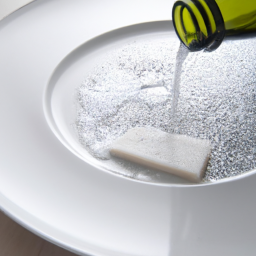
Using biodegradable dish soap has many benefits, including reducing harmful chemicals in our waterways. When it comes to cleaning our dishes, it’s important to consider the impact our choices can have on the environment. Luckily, there are now biodegradable soap options available that aren’t only effective at removing grease and grime, but also environmentally friendly.
The science behind biodegradable soap lies in its ability to break down naturally into harmless substances. Unlike traditional dish soaps that contain harsh chemicals, biodegradable soaps are made from natural ingredients that are easily broken down by bacteria and other microorganisms. This means that when the soap goes down the drain and into our waterways, it doesn’t cause harm to aquatic life or pollute our ecosystems.
In addition to reducing harmful chemicals in our waterways, using biodegradable dish soap also helps to minimize our carbon footprint. Traditional dish soaps often contain synthetic ingredients that are derived from non-renewable resources, contributing to greenhouse gas emissions. By choosing biodegradable options, we can support sustainable practices and reduce our impact on the environment.
How Biodegradable Soap Tackles Grease
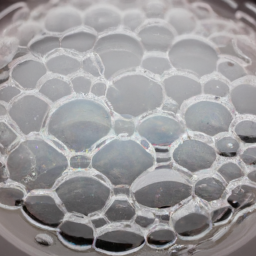
I’ve found that biodegradable soap tackles grease effectively, thanks to its unique ability to break down and remove stubborn oils and fats. Here are some ways in which biodegradable soap tackles grease and why it’s a great eco-friendly alternative to traditional dish soap:
Biodegradable soap contains powerful enzymes that specifically target grease molecules, breaking them down into smaller, more manageable particles.
The soap’s surfactants help to lift and suspend grease in water, allowing it to be easily rinsed away.
Unlike traditional dish soaps that may leave behind a residue, biodegradable soap rinses clean, leaving your dishes spotless and grease-free.
Biodegradable soap is gentle on your skin and the environment, as it’s made from natural, plant-based ingredients.
Using biodegradable soap reduces the amount of harmful chemicals and toxins being released into the water supply, making it a safer option for both you and the planet.
Choosing the Right Eco-Friendly Dish Soap
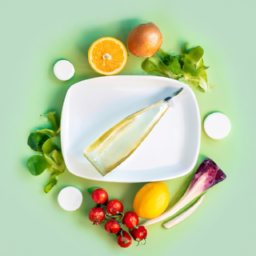
When it comes to selecting an eco-friendly dish soap, I’ve found that considering its ingredients and certifications is essential.
With so many eco-friendly alternatives available, it’s important to choose a product that not only cleans effectively but also minimizes harm to the environment. One of the first things to look for is a soap that’s free from harmful chemicals such as phosphates, chlorine, and synthetic fragrances. These chemicals can’t only be damaging to aquatic life, but they can also be harsh on our skin and respiratory system. Instead, opt for dish soaps that are plant-based and biodegradable.
In addition to the ingredients, it’s also important to look for certifications that guarantee the soap’s eco-friendliness. Certifications such as USDA Organic, EcoLogo, and Green Seal ensure that the soap meets specific environmental standards and has undergone rigorous testing. These certifications provide peace of mind, knowing that the soap has been independently verified for its environmental claims.
Tips for Effectively Using Biodegradable Soap
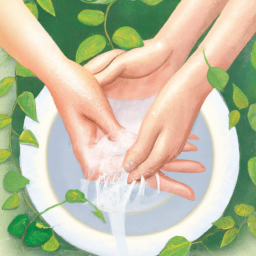
To ensure optimal results, I highly recommend utilizing a gentle scrubbing motion when applying biodegradable soap. This will help to effectively lift grease and grime from your dishes while also minimizing water waste.
Here are some additional tips for effectively using biodegradable soap:
Use eco-friendly packaging: Look for biodegradable soap that comes in packaging made from recycled materials or is itself biodegradable. This helps to reduce waste and minimize your environmental impact.
Follow the instructions: Different biodegradable soaps may have specific instructions for use, such as diluting the soap or using a certain amount. Make sure to read and follow these instructions to ensure the best results.
Soak heavily soiled dishes: For dishes that have stubborn grease or food particles, let them soak in warm soapy water for a few minutes before scrubbing. This will help to loosen the dirt and make it easier to clean.
Use a soft sponge or brush: Opt for a soft sponge or brush when scrubbing your dishes. Avoid using abrasive scrubbers that can damage the surface of your dishes.
Rinse efficiently: When rinsing your dishes, try to use as little water as possible. Use a dish rack or drying mat to air dry your dishes instead of using a dishwasher, which can consume more water.
Environmental Impact of Traditional Dish Soaps
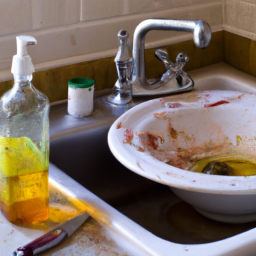
The environmental impact of traditional dish soaps is significant. They often contain harmful chemicals like phosphates and surfactants, which can pollute waterways and harm aquatic life. These chemicals can have long-lasting effects on the ecosystem. When these soaps are washed down the drain, they end up in rivers, lakes, and oceans, contaminating the water and disrupting the balance of the ecosystem.
Additionally, traditional dish soaps often come packaged in plastic bottles. This contributes to the global plastic waste problem, which is a major environmental issue. Plastic waste takes hundreds of years to decompose and can harm marine life. By using eco-friendly and biodegradable dish soaps, we can reduce the amount of plastic waste that ends up in landfills and oceans.
Promoting sustainable living is essential in today’s world. One way to do so is by choosing environmentally friendly products. By switching to biodegradable dish soaps, we can minimize our ecological footprint and protect our planet. These soaps are made from natural ingredients that break down easily, reducing their impact on the environment.
Frequently Asked Questions
How Does Biodegradable Dish Soap Compare to Traditional Dish Soap in Terms of Effectiveness?
Biodegradable dish soap is just as effective as traditional dish soap in removing grease. However, it has the added benefit of being better for the environment due to its biodegradable nature.
Are There Any Specific Precautions or Instructions for Using Biodegradable Dish Soap?
When using biodegradable dish soap, it’s important to follow a few precautions. Avoid ingesting or getting it in your eyes, and keep it out of reach of children. Use warm water and a small amount of soap for best results.
Can Biodegradable Dish Soap Be Used for Other Cleaning Purposes Besides Dishes?
Yes, biodegradable dish soap can be used for other cleaning purposes besides dishes. It can be used as an alternative for laundry soap, making it a versatile and eco-friendly option for cleaning.
What Are Some Common Ingredients Found in Biodegradable Dish Soaps?
Some common ingredients in eco-friendly dish soaps include plant-based surfactants, essential oils, and natural fragrances. They are just as effective as traditional soaps but without the harmful chemicals. Always follow specific precautions and ensure septic system safety. They can also be used for other cleaning purposes.
Is Biodegradable Dish Soap Safe for Use With Septic Systems?
Yes, biodegradable dish soap is safe for use with septic systems. It has a minimal environmental impact and breaks down easily. However, some brands may not be as effective at cutting through grease.
Conclusion
In conclusion, switching to eco-friendly biodegradable dish soap is a simple yet powerful way to say goodbye to greasy dishes and reduce our environmental impact.
This soap effectively tackles grease while being gentle on the planet.
By choosing the right eco-friendly dish soap and following some tips for effective use, we can make a positive change in our daily dishwashing routine and contribute to a cleaner and greener future.